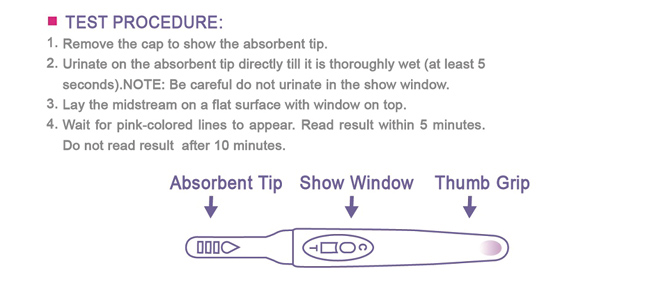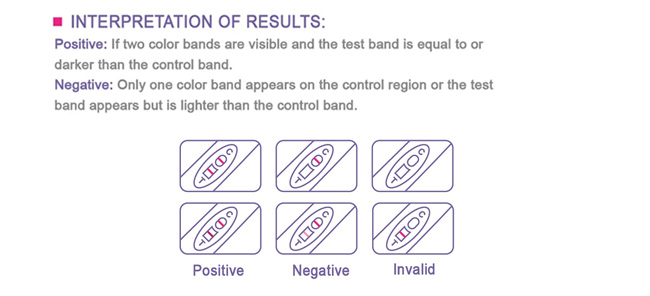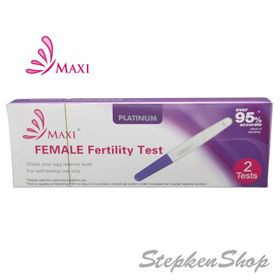Product Categories
Most popular
Understanding Your Ability to Get Pregnant The Maxi ® Female Fertility Test is an accurate test of FSH level to assess a woman's ability to get pregnant. How our Fertility Test Works:
 The Maxi ® Fertility Test for Women detects FSH (follicle stimulating hormone), on Day 3 of a woman menstrual cycle in order to assess her ovarian reserve, an indicator of fertility. Women who want to assess their ability to conceive may find the results of this test useful. The test must be done on Day 3 of your cycle. Count the first day of bleeding or spotting as Day 1 of your cycle. A small amount of blood in your urine from your period should not affect the results in any way. You must use your first morning urine. You should not have urinated for at least 4 hours prior to performing the test.  Q: When to Begin Testing? A: The test must be done on day 3 of your cycle. Count the first day of bleeding or spotting as day 1. You must use your first morning urine. You should not have passed urine for at least four hours before carrying out the test. Q: What is the ovarian reserve? A: The ovarian reserve has been established as an indicator of your eggs quantity and quality. Women are born with a limited number of eggs in their ovaries. One of these eggs is released each month (ovulation) until menopause. As a woman ages, the quantity and quality of her remaining eggs decreases, which also impacts the likelihood of these eggs to be fertilized. The Maxi ® fertility test for women uses day 3 FSH (follicle stimulating hormone) levels to gauge your ovarian reserve. Q: What is the difference between the Maxi ® Fertility Test For Woman and the Maxi ® Ovulation Tests? A: Maxi ® Ovulation Tests detect luteinizing hormone (LH). LH is always present in your urine and increases just before ovulation. This increase (or surge) in LH triggers ovulation, which is the release of an egg from your ovary. By detecting your surge, the Maxi ® Ovulation Tests predicts the two days you are most likely to get pregnant. TheMaxi ® Fertility Test for Woman detects a different hormone named follicle stimulating hormone (FSH) on day 3 of a woman menstrual cycle in order to assess her ovarian reserve. Your day 3 FSH level is an indicator of the quantity and quality of your eggs and thus your fertility potential. This test does not predict ovulation or your most fertile days. Neither product can be used for contraception Q: I used an ovulation test kit and have an LH surge; doesn that show that I am ovulating? A: While the LH surge is an important maker for ovulation, it does not give any indication of your ovarian reserve and how responsive that reserve is to the LH that triggers ovulation. By testing for FSH you can gauge the quantity and quality of your ovarian reserve, and understand if your LH surge should trigger ovulation. Q: The result shows my FSH level in the normal range. What does this mean? A: A normal FSH level indicates that you have adequate reserve. If your ovarian reserve is a normal level, and you have been trying to conceive for several months without success, you should consider consulting your physician. Q: The result shows that my FSH level is elevated and further testing may be appropriate. What does this mean? A: No in-home test can replace consultation with your doctor. The Maxi ® Fertility Test for Woman has indicated that your FSH level may be above levels that are expected on day 3 of your cycle. An elevated day 3 FSH level indicates that your ovarian reserve may be affecting your chances of conception. Consult your physician to discuss your results. Q: How accurate is the Maxi ® Fertility test for Woman? A: The Maxi ® Fertility Test for Woman is over 95% accurate in laboratory studies. Q: I have been waiting longer then 30 minutes, and still there are no lines in the result window. Is there anything wrong? A: There should be at least one pink line in the Result Window at 30 minutes. If not, the test is invalid. This could be due to insufficient urine of the Absorbent Tip or not laying the test stick on a flat surface with the Result Window facing up. If you have collected you first morning urine on Day 3 in a cup, you can retest with the second stick carefully following the directions. If you urinated directly on the test stick, you should wait to reset with a new stick on Day 3 of your next menstrual cycle, carefully following the directions. Q: Do any medical conditions affect the test? A: Certain medical conditions may adversely affect the reliability of this test for detecting FSH levels. These include pregnancy, postpartum, post-abortion, polycystic ovary syndrome (PCOS), ovarian cysts, the onset of menopause, and untreated hypothyroidism. Woman with medically diagnosed fertility problems, including those undergoing in-vitro fertilization, should consult their physicians before using this product. Q: Do any drugs or medications affect the test? A: Some prescription drugs, such as menotropins for injection (Pergonal) and danazol (Danocrine), may affect the result. If you are undergoing therapy with clomiphene citrate (e.g., Clomid or Serophene), please consult your physician for the appropriate time to being testing. Hormonal contraceptives will affect the results of this test. Medications containing hCH or LH may affect this test and should not be taken while using this test. The use of alcohol, painkillers, and antibiotics will not affect the result. Q: Will oral contraceptives affect the results? A: Hormonal contraceptives will affect the results of this test. After using hormonal contraceptives, your cycle may be irregular and may take some time to stabilize again. It is important to wait until you have had two normal periods before taking the Maxi ® Fertility Test for Woman. Q: Can this test detect all fertility issues? A: No, the test does not detect all fertility issues. If your test result is the normal FSH range and if you are in any one of the following groups, then you need to consult your doctor: Women under 35 years of age who have been trying to get pregnant for over 12 months; women 35 years of age or older who have been trying to get pregnant for over 6 months, or women of any age who do not have menstrual periods or have irregular periods. |













